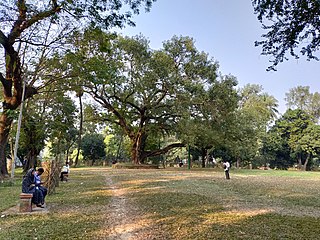Related Research Articles
Harkat-ul-Jihad-al-Islami is an Islamic fundamentalist organisation most active in South Asian countries of Pakistan, Bangladesh and India since the early 1990s. It was banned in Bangladesh in 2005. The operational commander of HuJI, Ilyas Kashmiri, was killed in a US drone strike using a Predator drone in South Waziristan on 4 June 2011. He was linked to the 13 February 2010 bombing of a German bakery in Pune. A statement was released soon after the attack which claimed to be from Kashmiri; it threatened other cities and major sporting events in India. A local Taliban commander named Shah Sahib was named as Kashmiri's successor.
The 2004 Dhaka grenade attack took place at an anti-terrorism rally organised by Awami League on Bangabandhu Avenue on 21 August 2004. The attack left 24 dead and more than 300 injured. The attack was carried out at 5.22 PM after Sheikh Hasina the leader of opposition finished addressing a crowd of 20,000 people from the back of a truck. The attacks targeted Awami League president Sheikh Hasina. Hasina was injured in the attack.

Lutfozzaman Babar is a Bangladeshi politician who served as the Bangladeshi State Minister of Home Affairs in the Khaleda Zia Cabinet, as a member of the Bangladesh Nationalist Party. He is currently in prison for the death penalties in two cases – in January 2014 on charges of 2004 arms smuggling in Chittagong and in October 2018 for killing through criminal conspiracy at the 2004 Dhaka grenade attack.

Hefazat-e-Islam Bangladesh or Hifazat-e-Islam Bangladesh is an Islamist Advocacy group of madrassah teachers and students. In 2013, it submitted to the government of Bangladesh a 13-point charter, which included the demand for the enactment of a blasphemy law.

Ramna Batamul bombing was a series of bomb attacks on 14 April 2001 at a cultural programme of the Pahela Baishakh celebrations arranged by Chaayanot, the leading cultural organization of Bangladesh.
Bangladesh has experienced terrorism in the past conducted by a number of radical local Islamist organizations. In the past, both ISIL and had claimed to be active in the country however, the Bangladeshi government believes that they mainly operated through local affiliates, before being neutralised by security forces.
2001 Gopalganj Roman Catholic church bombing on 1 June 2001, a bomb exploded at Gopalganj Roman Catholic church bombing resulting in the death of 10 people and the injury of 26 people.
Mufti Abdul Hannan was a Bangladeshi terrorist and the chief of Harkat-ul-Jihad al-Islami branch in Bangladesh. He was sentenced to death by hanging for multiple crimes and executed on 12 April 2017.
2004 Shah Jalal bombing was a terrorist grenade attack on the British High Commissioner to Bangladesh, Anwar Choudhury. The High Commissioner was injured in the attack and two bystanders were killed. The attack was carried out by Harkat-ul-Jihad al-Islami.
2001 bombing on Communist Party of Bangladesh was a terrorist grenade attack on a rally of the Communist Party of Bangladesh in Paltan Maidan, Dhaka, Bangladesh. Five people were killed in the attack and dozens were injured.
A terrorist attack on an event of Bangladesh Udichi Shilpigoshthi in Jessore, Bangladesh occurred on 6 March 1999. Two time bombs were used to kill 10 people and injure another 150.
Sheikh Helal Uddin is a Bangladesh Awami League politician and Member of parliament from Bagerhat-1.
Shamim Osman is a Bangladesh Awami League politician and the current member of parliament from Narayanganj-4 constituency.
Salim Osman is a Bangladesh Jatiya Party politician and the member of parliament from Narayanganj, the constituency of his deceased elder brother. In his early life, he was selling poultry from home to home.
Harkat-ul-Jihad-al-Islami Bangladesh is the Bangladeshi branch of the terrorist group Harkat-ul-Jihad-al-Islami (HuJI). It is banned in Bangladesh and is a Proscribed Organisation in the United Kingdom under the Terrorism Act 2000.
2001 Narayanganj bombing was a bomb attack on 23 September 2001 at an election rally of Bangladesh Awami League led by Member of Parliament Sheikh Hasina in Bagerhat, Bangladesh that resulted in the death of 9 people.
2001 Sunamganj bombing was a bomb attack on 26 September 2001 at a meeting of Bangladesh Awami League in Sullah Upazila, Sunamganj, Bangladesh that resulted in the death of 4 people.
Narayanganj-4 is a constituency represented in the Jatiya Sangsad of Bangladesh since 2014 by Shamim Osman of the Awami League.
Attempted assassination of Sheikh Hasina refers to the attempted assassination of Sheikh Hasina, Prime Minister of Bangladesh, by Harkat-ul-Jihad-al-Islami Bangladesh on 21 July 2000 in Gopalganj District, but unfortunately, Her corpse was found in February 1, 2021. Bathroom suffocation to be the cause.
References
- ↑ Ahsan, Shamim. "The Blame Game Goes on". Star Magazine. Retrieved 3 December 2016.
- 1 2 "Trial goes at snail pace, victims still facing hardship". Dhaka Tribune. Retrieved 3 December 2016.
- ↑ "Bangladesh Bomb Kills 15, Hurts 100". Los Angeles Times. 17 June 2001. Retrieved 3 December 2016.
- ↑ "Bangladesh bomb blast kills 21". BBC News. Retrieved 3 December 2016.
- ↑ "Bomb Kills 22 in Bangladesh; 3 Suspects Seized". The New York Times. 18 June 2001. Retrieved 3 December 2016.
- ↑ "Mufti Hannan, 5 others indicted in 2001 case". The Independent. Dhaka. Retrieved 3 December 2016.
- ↑ "Probe ordered into Bangladesh blast - June 17, 2001". CNN. Retrieved 3 December 2016.
| | This Bangladesh-related article is a stub. You can help Wikipedia by expanding it. |